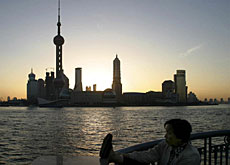
Swiss firms cosy up to Chinese dragon

Swiss businesses starved of growth by their country’s stagnating economy are increasingly turning their attention to China’s booming markets.
During his five-day visit to China, Swiss President Pascal Couchepin is aiming to smooth the way for closer economic and business ties between the two nations.
Shortly after Couchepin’s arrival, Beijing announced that Switzerland would be granted Approved Destination Status (ADS), a decision that is expected to draw vast numbers of Chinese tourists to the Alpine nation.
Switzerland has been pushing for ADS for several years. Chinese tourists accounted for only 120,000 overnight stays in Switzerland last year.
Less than ten million Chinese travelled abroad out of a population of 1.3 billion, but the figure expected to rise dramatically in the coming years.
Swiss businesses already have a strong presence in China, with 600 companies established there. Ten years ago, they employed around 4,000 people; today, the figure has jumped to 40,000.
The Swiss food giant, Nestlé, has 21 factories dotted around the country, employing 10,000 people and generating turnover of SFr1 billion ($770 million). ABB, the Swiss-Swedish engineering group, employs 6,500 people.
One firm that was quick to spot China’s potential was Schindler, a lift manufacturer, which set up shop in the Asian nation in 1980 and today employs 2,000 people.
It has since been joined by dozens of other Swiss companies, including pharmaceutical giants Roche and Novartis, Swiss banks UBS and Credit Suisse, and insurers such as Swiss Life and Swiss Re.
Export potential
Although many Swiss companies have taken advantage of China’s cheap labour, few have established trade links with the country.
Swiss-Sino trade ties are still in their infancy, with only 0.2 per cent of Chinese exports destined for Switzerland.
And even though China is Switzerland’s second-most important trading partner in Asia after Japan, Swiss products account for only 0.7 per cent of Chinese imports.
China has been focusing on developing its domestic economy rather than boosting exports. Although China is 230 times larger than Switzerland, exports in 2002 totalled $620 billion – only three times more than Swiss exports ($190 billion).
Stable giant
The apparent stability of the Chinese economy is also a big draw for investors already persuaded of its potential.
The Chinese economy has shown itself to be particularly resilient in the face of crises such as the 1997 Asian stock market crash. It also emerged relatively unscathed from the Sars scare.
This is a notable draw for foreign investors, who last year poured more money into China than the United States. To date, Swiss investments in China are estimated to total around SFr2 billion.
But it hasn’t been smooth sailing all the way: many investors have come up against deep cultural differences, the Communist regime, corruption and a lack of transparency.
The insurer Winterthur, for instance, was awarded a licence in 1996, but has since been unable to carve out a niche for itself beyond a partnership with a Chinese insurer. Last year rival Swiss Life pulled out of China altogether.
swissinfo, Erwin Dettling (translation: Vanessa Mock)
Chinese exports were worth $325 billion in 2003, with 0.2% destined for Switzerland.
In 2002, imports to China totalled $295 billion, with Swiss products accounting for 0.7%.
The Chinese economy is forecast to grow by 7.5% in 2003 to reach a GDP of $1,372 billion.

In compliance with the JTI standards
More: SWI swissinfo.ch certified by the Journalism Trust Initiative


























You can find an overview of ongoing debates with our journalists here . Please join us!
If you want to start a conversation about a topic raised in this article or want to report factual errors, email us at english@swissinfo.ch.